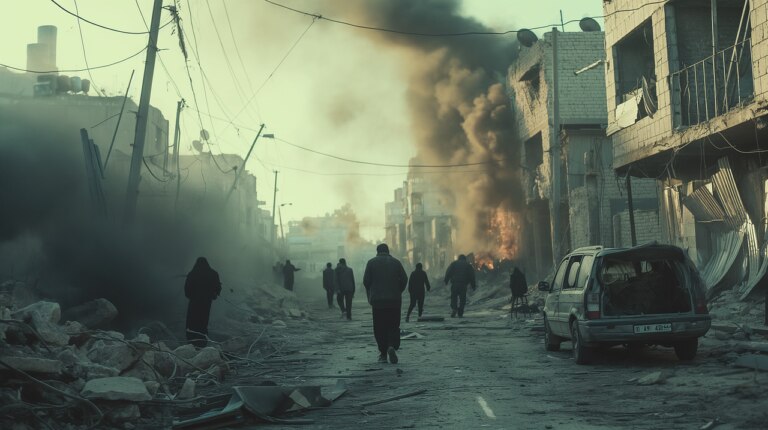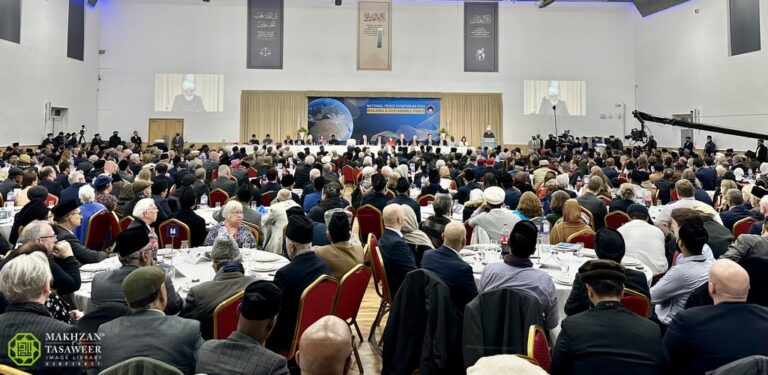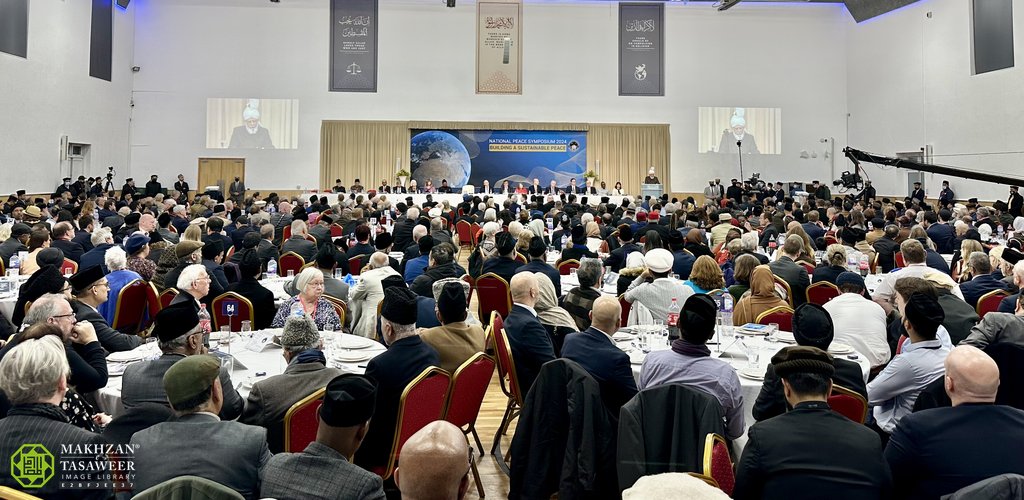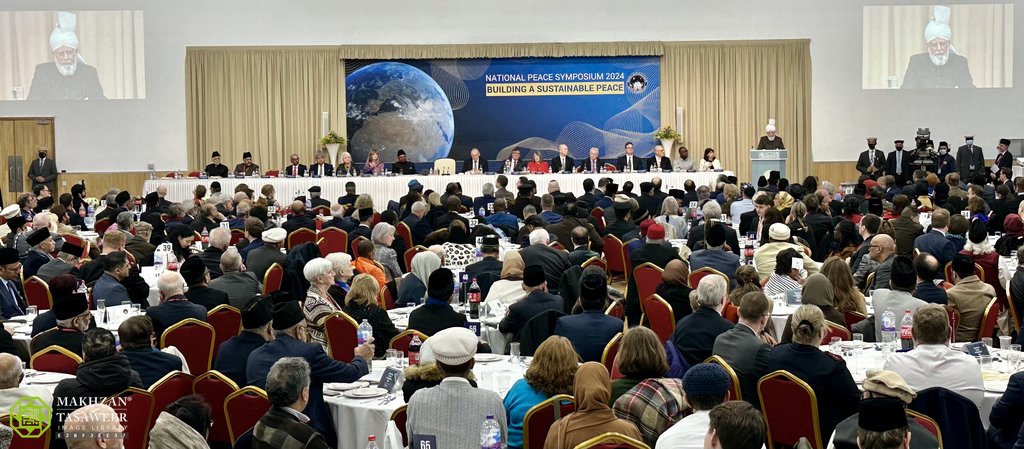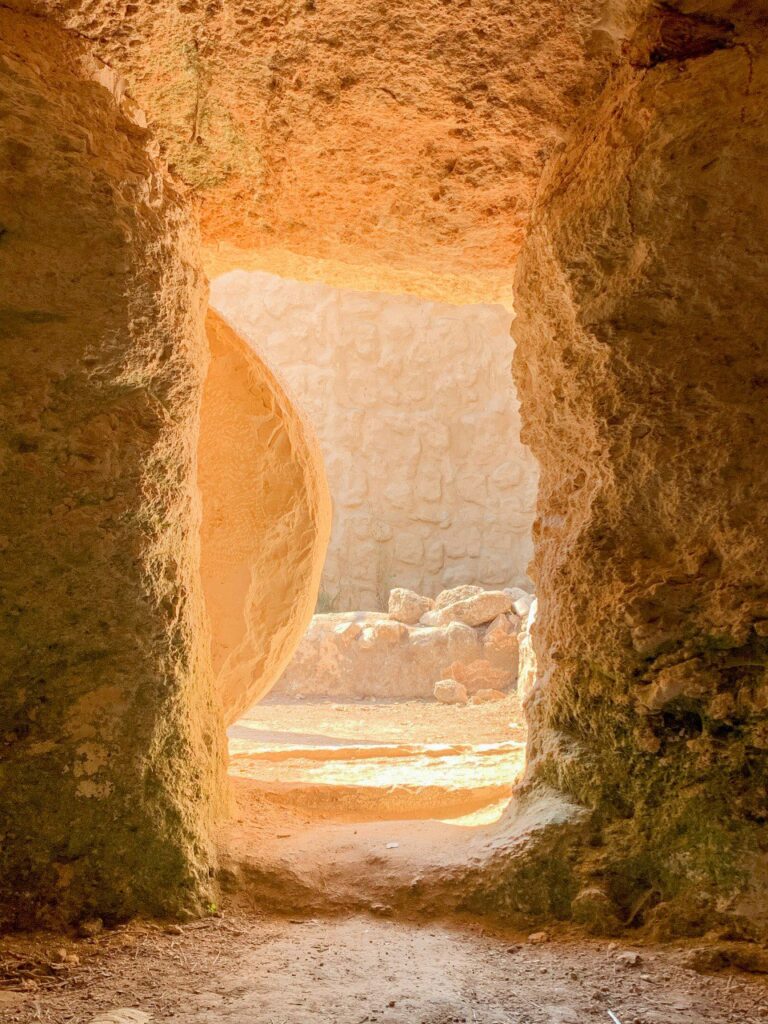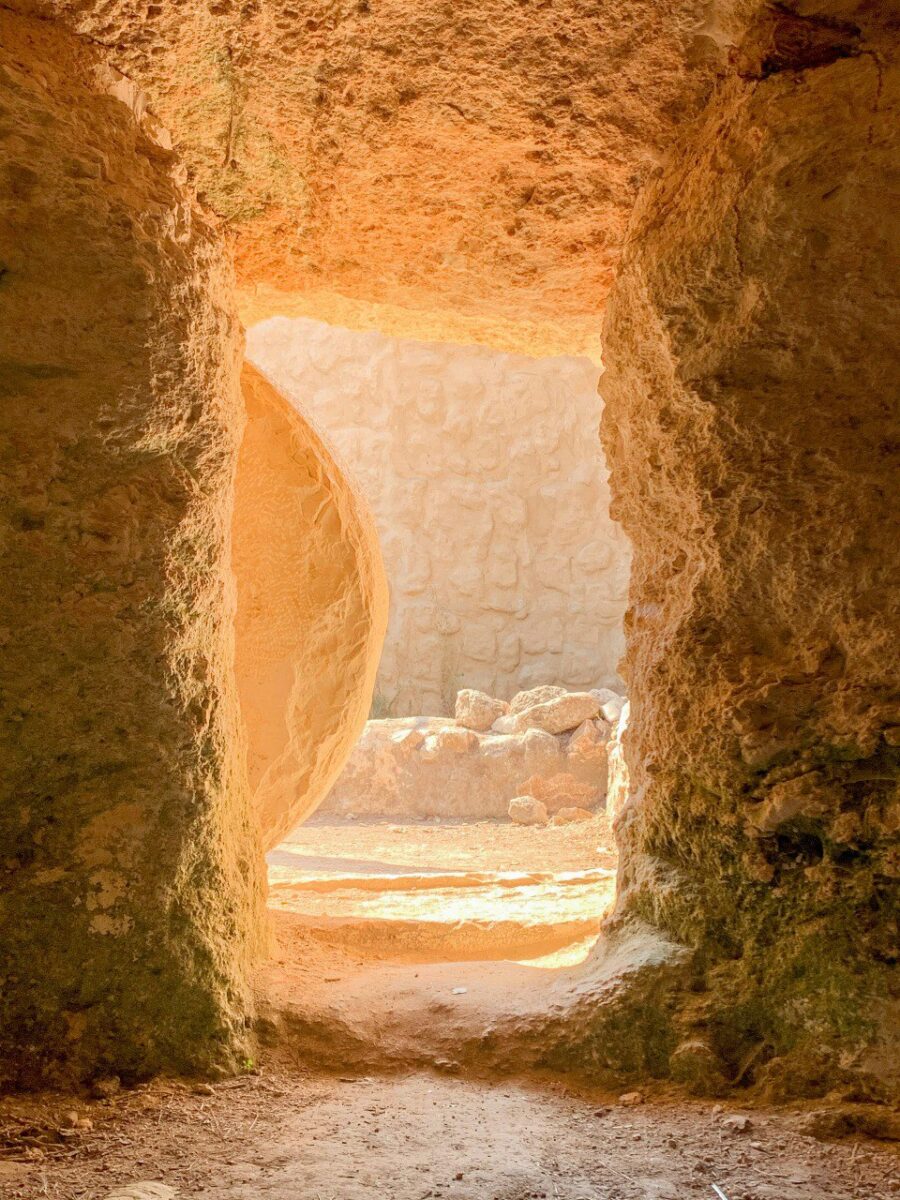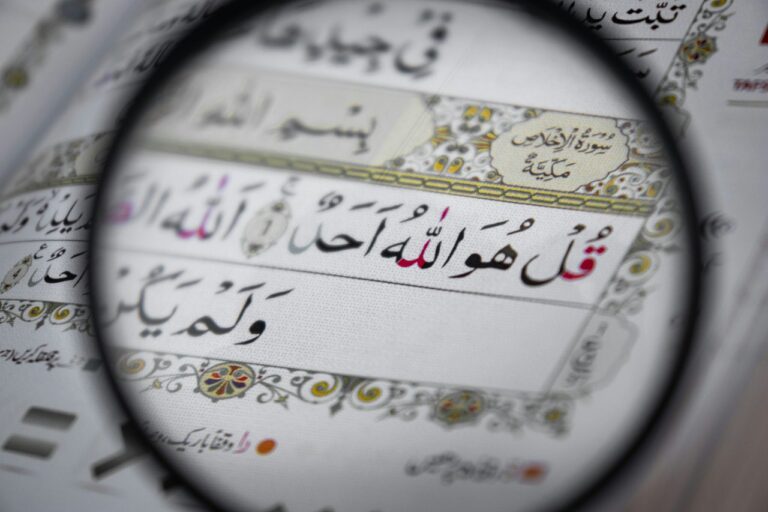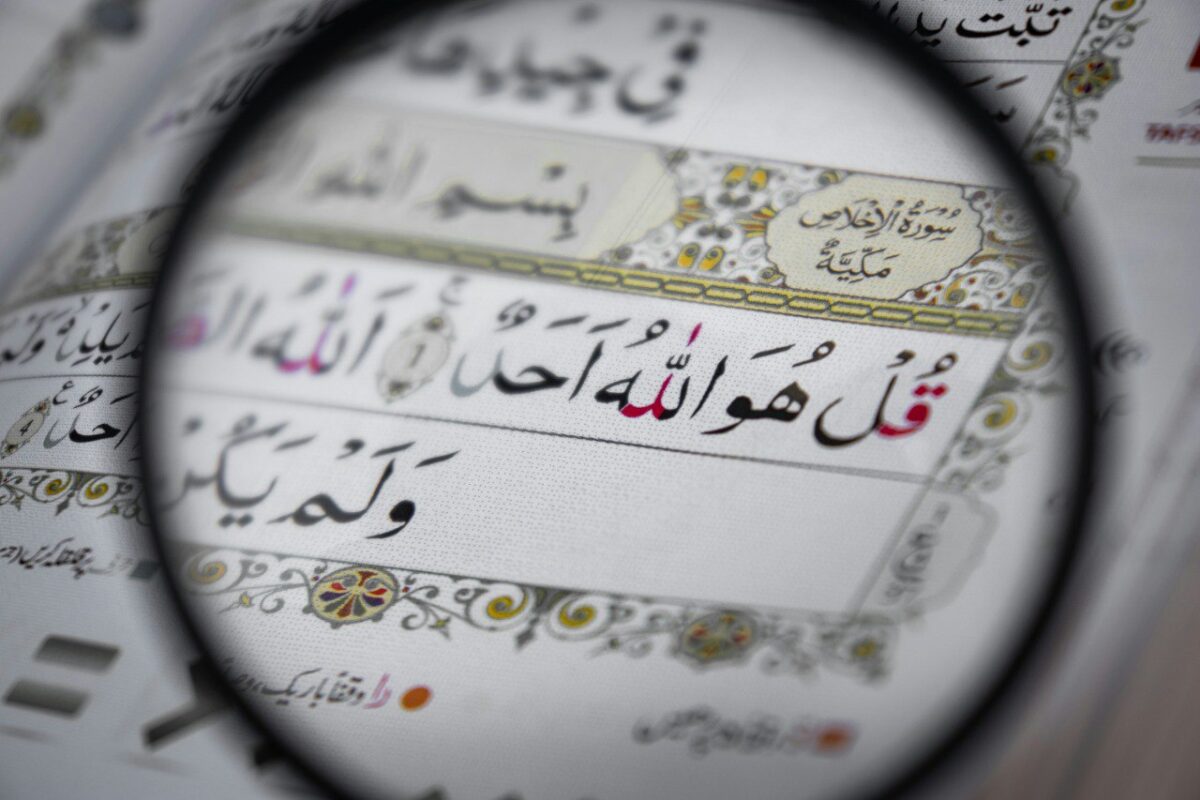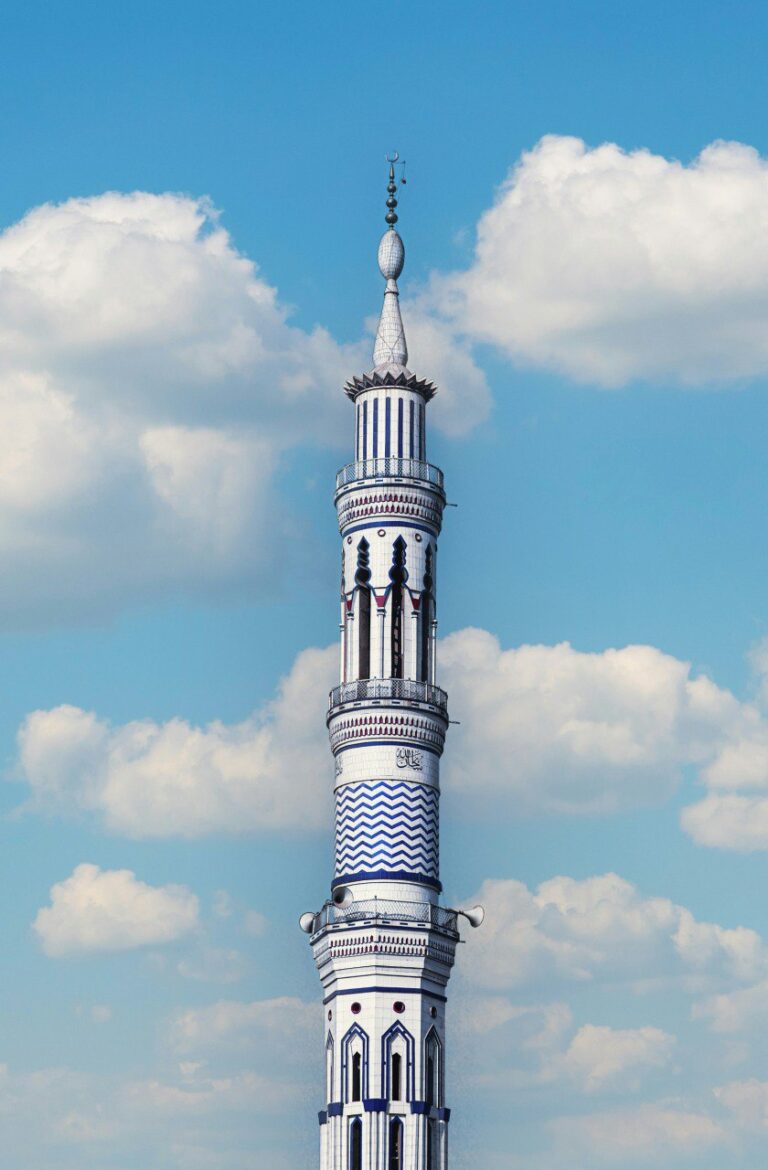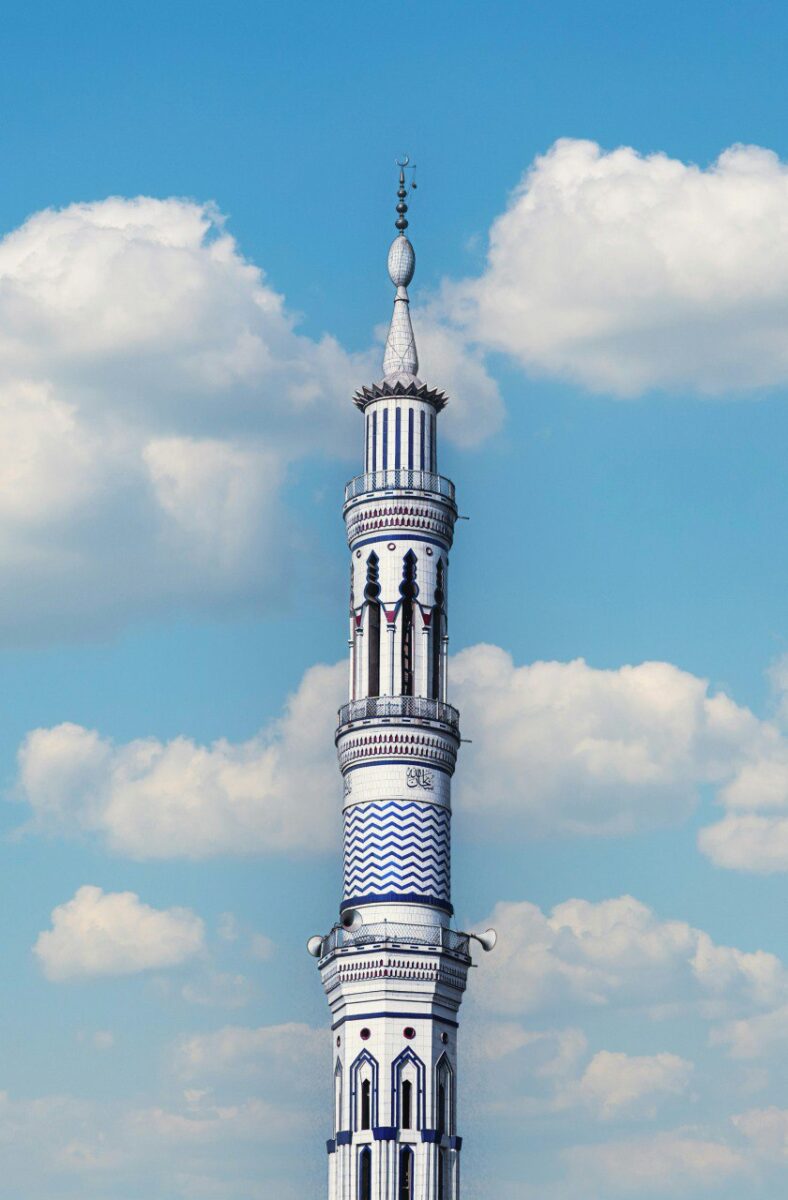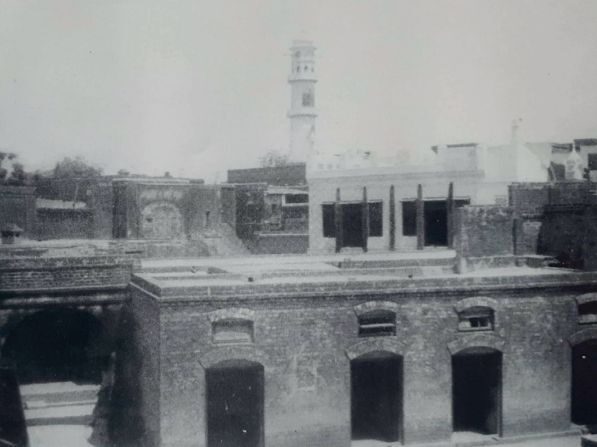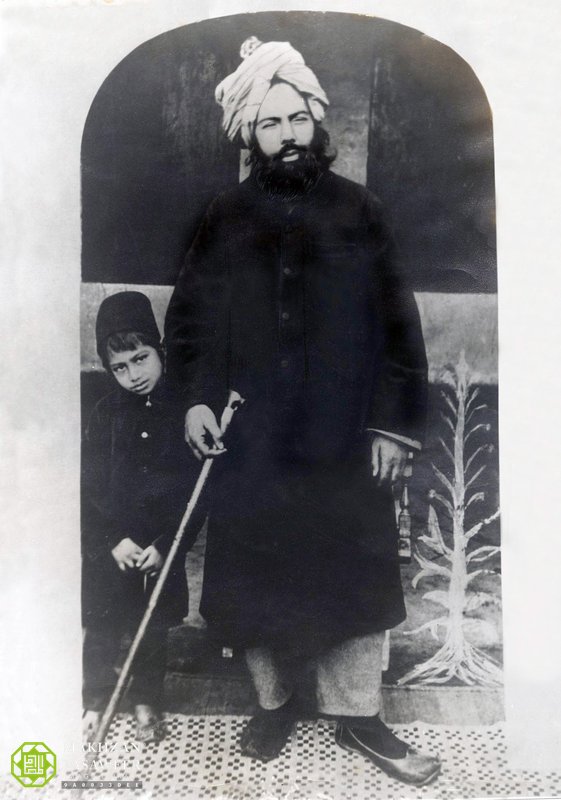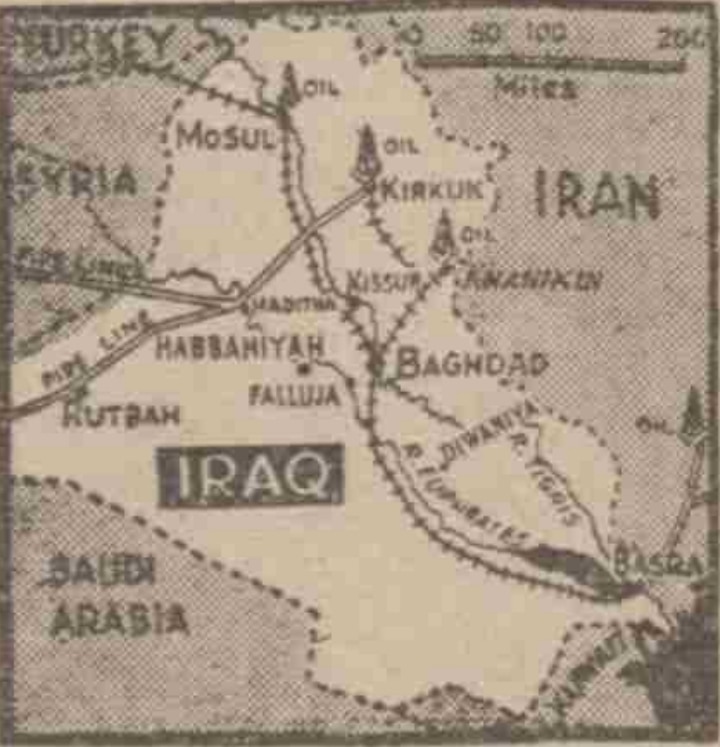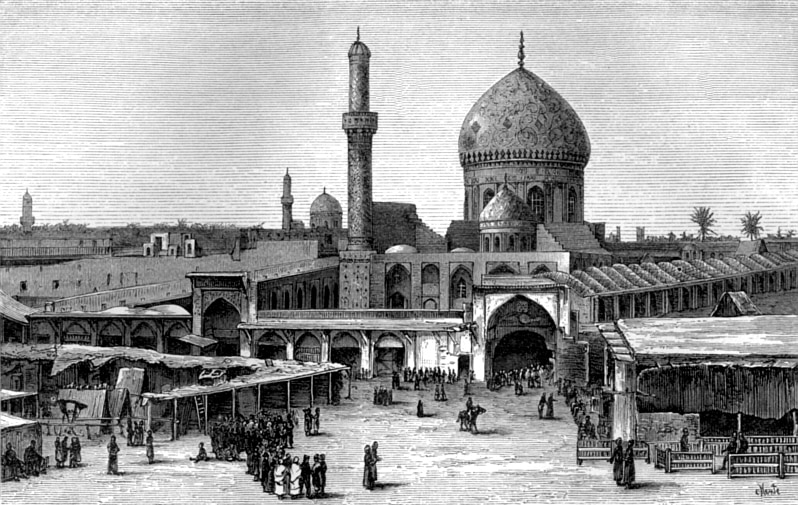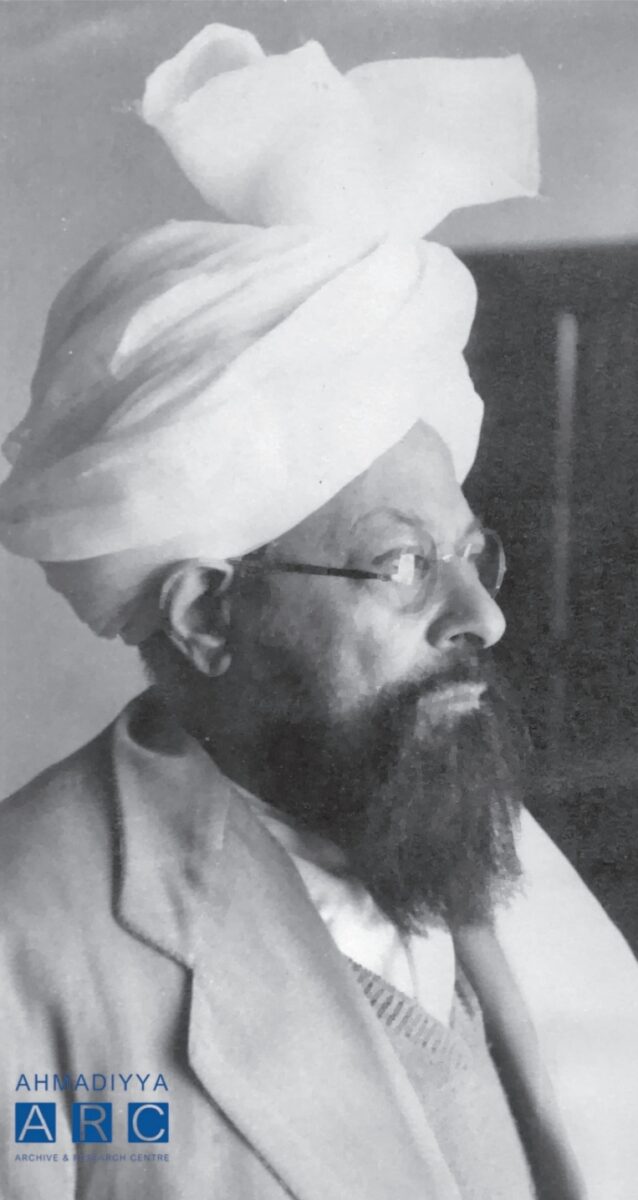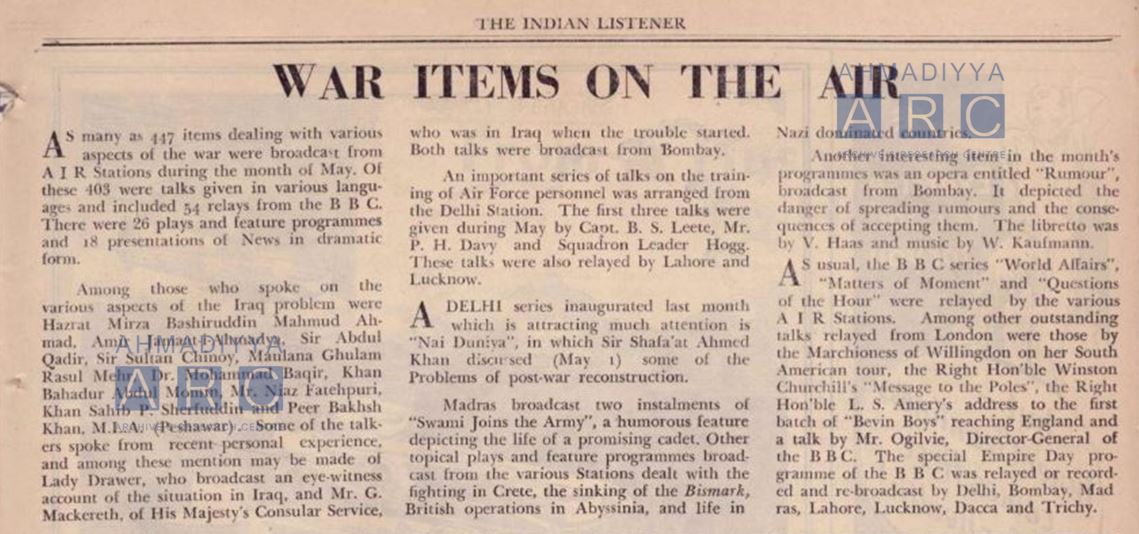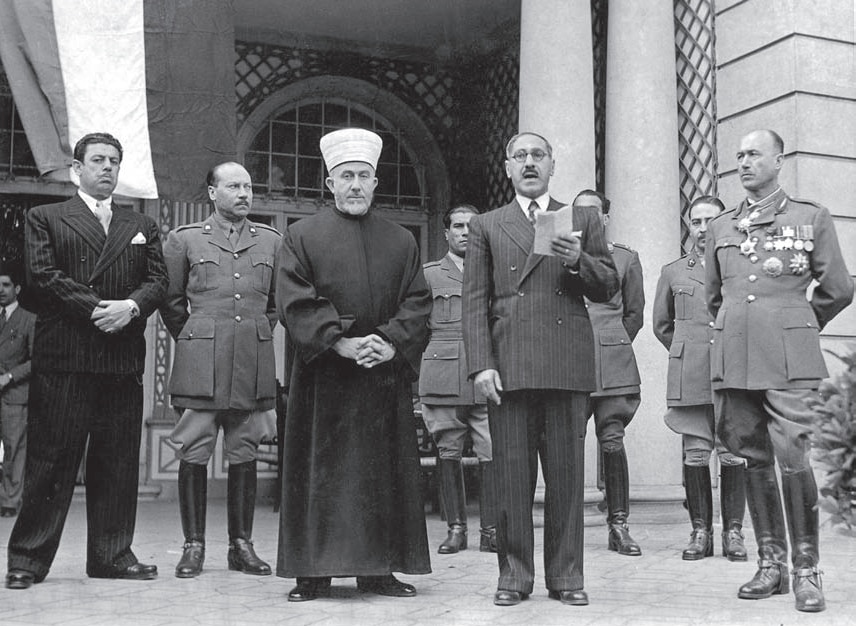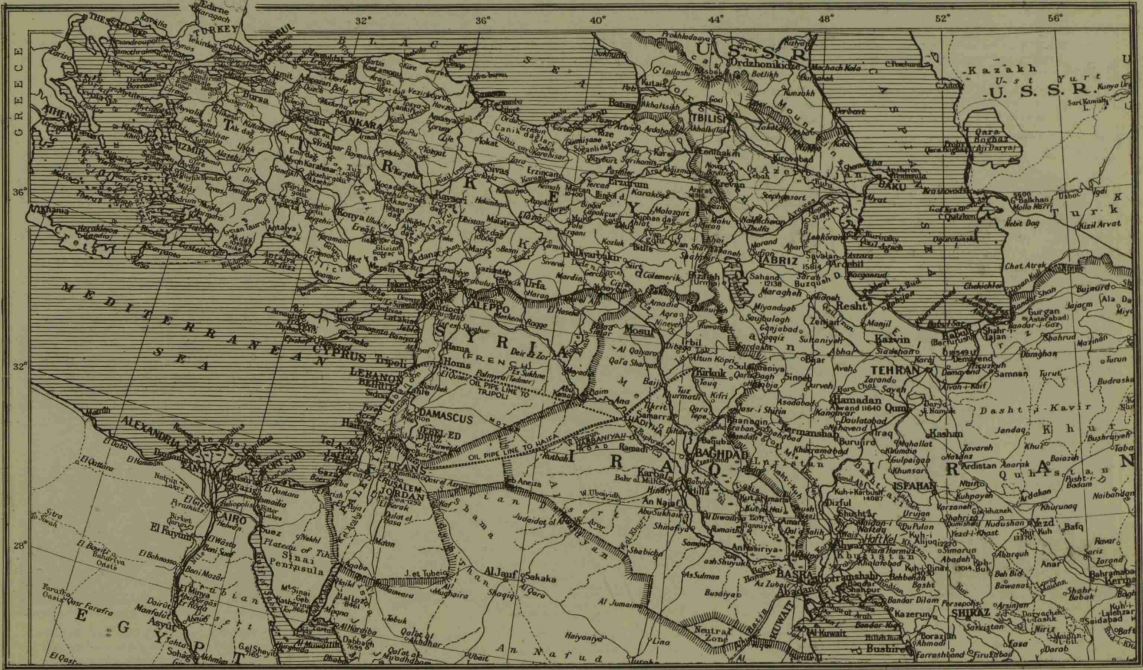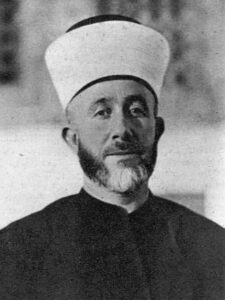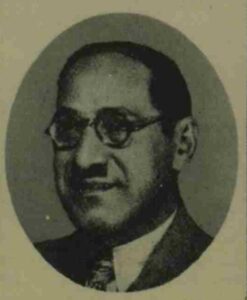Baitul Futuh Mosque, London: At approximately 19:15 GMT, Hazrat Mirza Masroor Ahmad, Khalifatul Masih Vaa arrived at the Tahir Hall of the Baitul Futuh Mosque Complex for the Ahmadiyya Muslim Community UK’s National Peace Symposium 2024.
The formal event started with a recitation from the Holy Quran (Ch.4: V.136) by Nafees Qamar Sahib, followed by its English translation by Hazeem Arif Sahib.
National Amir Jamaat-e-Ahmadiyya UK, Rafiq Ahmad Hayat Sahib, gave the welcome speech and an introduction to the Peace Symposium, highlighting the wars between Russia and Ukraine and the relentless suffering of Palestinians at the hands of Israel. He introduced Hazrat Amirul Momineen’saa efforts to establish world peace and his efforts to help humanity throughout the world.
Following the welcome and introductory remarks, Dame Siobhan McDonagh MP, Jonathan Lord MP, and Sir Ed Davey MP each spoke on the urgent need for peace and global cooperation. Subsequently, the announcement of the Ahmadiyya Muslim Prize for the Advancement of Peace highlighted the contributions of two distinguished honorees: Adi Patricia Roche, recognised for her post-Chernobyl disaster efforts, received the 2020 award, and David Spurdle, acknowledged for his dedication to orphans and underprivileged children globally, was honoured with the 2023 award. Both recipients also shared their insights and experiences at the event.
Hazrat Mirza Masroor Ahmad, Khalifatul Masih Vaa, then took to the podium to deliver the keynote address.
Huzooraa said that over the years he has constantly expressed his views on how an end can be brought to all forms of warfare.
“Certainly history teaches us that internal conflicts can spiral into regional wars, often fuelled by the influence and interference of external powers.”
Huzooraa said that in recent decades, we have witnessed the effects of the external interference of such powers. Huzooraa noted:
“Unfair political and legal economic systems that have prevailed in much of the world are triggering an ever-rising tide of inequality, which in turn is fueling global instability and security.”
Over the years, politicians, intellectuals and members of the public have agreed with Huzoor’saa assertion that we should strive for peace. However, some had previously said that Huzooraa was wrong to believe that the conflicts would turn into a global war and the use of nuclear weapons.
“Many considered this to be unnecessarily pessimistic.” For a long time, some people did not agree with Huzooraa, either due to their idealism or habit of looking at the world through rose-tinted glasses or perhaps their inability to learn lessons from history. Huzooraa said that perhaps they simply did not wish to accept the reality of what was staring them in the face.
“They seemingly ignored the widening cracks that have been opening up” in recent decades. Huzooraa said, “As they say, ignorance is bliss.”
Huzooraa said that today, as wars rage in Europe, the Middle East and elsewhere, many people are now raising their alarm about the possibility of a global war in which the use of nuclear powers would wreak unimaginable levels of havoc and destruction in the world. “But despite this realisation, many still seem unwilling to consider what must be done to end these conflicts.”
Huzooraa continued:
“As I thought about today’s event, I wondered whether there was any point in us gathering here again. What benefit was there for us to speak about peace and justice if those with the power and ability to influence change were determined not to hear us.”
“Instead of faithfully serving the cause of peace and justice, they wield their veto like a trump card,” Huzooraa added.
Huzooraa said, “The stark reality is that even those institutions founded with the primary objective of maintaining the peace and security of the world are becoming increasingly irrelevant.”
Speaking about the United Nations, Hazrat Amirul Momineenaa said:
“For example, the UN has become a weak and almost powerless body where a few dominant nations yield all the power and easily override the views of the majority.”
Huzooraa said that “instead of deciding each issue based on its facts and merits, nations have formed alliances and vote according to their self-interest.”
“Ultimately, critical decisions are made by a few privileged nations, in whose hands rests the veto power. Instead of faithfully serving the cause of peace and justice, they wield their veto like a trump card, whenever their narrow interests are threatened.” This is done regardless of whether their decisions cause scores of innocent people to be negatively affected.
“Let it be clear, therefore, that where a Veto power exists, the scales of justice can never be balanced.”
Huzooraa said that nevertheless, despite all these reservations, he realised that he must use this opportunity to speak because Islam teaches Muslims to never waver in the pursuit of peace. “It teaches us to speak the truth so that, when held accountable before Allah the Almighty, a believer can truthfully claim to have tried his utmost to save His creation from destruction.”
Further, the Holy Prophetsa has stated that the greatest form of Jihad, a very misunderstood and misrepresented term, is to speak courageously before one’s leaders, especially those who are cruel.
Huzooraa said:
“Certainly, if weaker nations or individuals like myself who have no political affiliation try to speak up, it is rarely appreciated, and those who do can face difficulties or risk sanctions. Despite this, the Ahmadiyya Muslim Community, based on the teachings of Islam, continues and will always continue to strive earnestly in the cause of peace and champion the rights of those who are powerless and are the victims of injustice.”
Huzooraa said that we will use all we have in our power to influence those we can to strive towards establishing peace in the world. The Ahmadiyya Muslim Community is making constant efforts to do this and you may be aware of this.
Huzooraa noted that due to the inflammatory comments of some politicians against Islam, recently the question of Islam and wars has been raised.
None of the founders of the major religions, including Jesusas, Mosesas, Holy Prophet Muhammadsa, or any other prophet of God, ever taught their followers to disregard the peace of society and resort to aggression. Yes, in extreme circumstances, the limited use of force was allowed, but this was done with the sole intention of ending warfare and oppression.
Islam literally means peace, and every aspect of its teachings reflects this name. The Muslims were only given permission to fight in self-defence, and historically, they only fought back after enduring years of endless persecution.
In chapter 42 of the Holy Quran, Allah commands that where a person or nation has been wronged, they should never respond to disproportionality nor fall into seeking revenge. The verse states:
وَجَزٰٓؤُا سَیِّئَۃٍ سَیِّئَۃٌ مِّثۡلُہَا ۚ فَمَنۡ عَفَا وَاَصۡلَحَ فَاَجۡرُہٗ عَلَی اللّٰہِ ؕ اِنَّہٗ لَا یُحِبُّ الظّٰلِمِیۡنَ
“And the recompense of an injury is an injury the like thereof; but whoso forgives and [his act] brings about reformation, his reward is with Allah. Surely, He loves not the wrongdoers.” (Surah ash-Shura, Ch.42: V.41)
Furthermore, Allah says it is better to forgive if it can lead to reformation.
In chapter 49 of the Holy Quran, Allah gives the solution to when two nations go to war:
وَاِنۡ طَآئِفَتٰنِ مِنَ الۡمُؤۡمِنِیۡنَ اقۡتَتَلُوۡا فَاَصۡلِحُوۡا بَیۡنَہُمَا ۚ فَاِنۡۢ بَغَتۡ اِحۡدٰٮہُمَا عَلَی الۡاُخۡرٰی فَقَاتِلُوا الَّتِیۡ تَبۡغِیۡ حَتّٰی تَفِیۡٓءَ اِلٰۤی اَمۡرِ اللّٰہِ ۚ فَاِنۡ فَآءَتۡ فَاَصۡلِحُوۡا بَیۡنَہُمَا بِالۡعَدۡلِ وَاَقۡسِطُوۡا ؕ اِنَّ اللّٰہَ یُحِبُّ الۡمُقۡسِطِیۡنَ
“And if two parties of believers fight [against each other], make peace between them; then if [after that] one of them transgresses against the other, fight the party that transgresses until it returns to the command of Allah. Then if it returns, make peace between them with equity, and act justly. Verily, Allah loves the just.” (Surah al-Hujurat, Ch.49: V.10)
Commenting on this, Huzooraa said:
“The objective should always remain to build sustainable peace underpinned by justice, it should not be that a third party takes advantage of the vulnerability of the warring parties by usurping their rights for his own benefit.”
Huzooraa said:
“Without a doubt, every Muslim nation and government must abide by these Islamic teachings. Setting aside religion, I also believe if none Muslim nations adopted these principles, then even if wars occurred, they would not lead to such deep-rooted enmities”. “So, all nations involved in warfare […] should recognise that peace can only be established if they act upon these principles of warfare and conflict resolution.”
Huzooraa said if such principles were observed by the UN and other relevant bodies, conflicts would be resolved far more swiftly.
“However, it will prove impossible for true peace to emerge so long as nations, either directly or through their powerful allies, can utilise a veto power.”
Huzooraa said that “the fate of the United Nations seems set to mirror that of its failed predecessor, the League of Nations,” and if the system of international law, weak as it may be, completely collapses, the resulting anarchy and destruction is beyond our comprehension.
Some people may have been conditioned to think that the Israel and Palestine conflict is a religious war, but it is a geopolitical and territorial conflict. As for the war in Ukraine, it is very evidently a geo-political war being fought for territorial reasons.
“I firmly believe that there is only one way to end these wars, by ensuring that justice prevails and that whatever settlements are made are based on equity as opposed to what better serves the interests of external powers. Otherwise, there is no benefit to the UN or international laws and the only rule that shall hold weight will be the one that declares might is right.
“In terms of the Ukraine war, Russia has veto power at the UN Security Council, whilst, in effect, Ukraine also has one by virtue of its alliance with those Western nations who have permanent membership of the Security Council. How can a settlement be agreed, if both sides can effectively wield a veto?”
Huzooraa said that, as for the Israel-Palestine issue, the veto power has only been used in Israel’s favour.
Huzooraa said that Islam emphasises justice to the highest degree, and surely even non-religious people will understand the importance of such teachings.
It is often alleged that Islam is an extremist religion due to comments by certain politicians. It should be clear that the wars fought by the Holy Prophet Muhammadsa and his Khulafa were entirely defensive. Only after they were subject to years of severe persecution was this permission granted. Huzooraa presented the following verse of the Holy Quran:
اُذِنَ لِلَّذِیۡنَ یُقٰتَلُوۡنَ بِاَنَّہُمۡ ظُلِمُوۡا ؕ وَاِنَّ اللّٰہَ عَلٰی نَصۡرِہِمۡ لَقَدِیۡرُ
“Permission [to fight] is given to those against whom war is made, because they have been wronged — and Allah indeed has power to help them.” (Surah al Hajj, Ch. 22: V. 40)
Huzooraa expounded on defensive wars and said that there were stringent rules in place to make sure they did not exceed the bounds.
The Holy Prophetsa strictly forbade targeting civilians, making sure the scope of war remained as limited as possible, forbade desecrating places of worship of opponents, the previous practices of mutilation and said the dead bodies resulting from war were to be treated with care. Justice was to be upheld every step of the way. The Holy Prophetsa went so far as to say that in battle, the face should not be struck, and also that bases should not be set up in places that would cause distress.
These are the basic rules of Islamic warfare, and the Holy Prophet said that everyone was to uphold them.
Therefore, all nations involved in any sort of warfare must realise that any peace in the world can only be established by following these principles. Otherwise, we are on the precipice of war.
Huzooraa quoted Professor Jeffery Sachs, who spoke of the injustices of Western nations and Senator Bernie Sanders, who spoke of the injustices of Israel.
He said, “During a recent interview, US Senator Bernie Sanders, who himself is Jewish, strongly condemned the actions of the Israeli government.”
He said that what Netanyahu and his government are doing in Gaza to its people is indescribable and unspeakable. We are looking at 25-26,000 people who have been killed already (this figure was when he made the statement, since then, the number has increased). Two-thirds of them are women and children. 65,000 people have been wounded, 70% of the housing units in Gaza have been destroyed, and 1.8 million people have been pushed out of their homes, God knows where they are going, he said.
Senator Bernie Sanders continued to say that there is a possibility of hundreds of thousands of children starving to death in Palestine, and the US, with its financial support for Israel, is complicit in what is happening. He said he would be damned if he were to give another nickel to Netanyahu in order to continue this war with the people of Palestine.
Talking about the endless brutalities in the world, Huzooraa expressed:
“I hope and pray that – before it is too late – the world comes to its senses and brings an end to the brutalities and wars taking place in the world
Talking about the future of the world and the responsibility of the world, Huzooraa said:
“If we wish to save our future generation from being born with the ill effects of radiation caused by nuclear warfare, and desire to save them from deprivation and desperation […] we must act with urgency and wisdom. Political leaders and those who have access to policymakers must take a long-term view of what is in the best interest of mankind, rather than being blinded by selfish desires to assert their superiority over others. We must all come together, setting aside national, political and other vested interests, for the greater good of humanity.
In conclusion, Huzooraa said:
“It is the need of the time that we must focus all our energies and efforts on establishing true peace so that we may live in a world of hope and prosperity, rather than a world defined by inequality, hatred and bloodshed.”
At the end, a silent prayer was led by Huzooraa.
Before the address by Hazrat Khalifatul Masih Vaa, Dame Siobhan McDonagh MP, Jonathan Lord MP, and Sir Ed Davey MP, as well as the two peace awardees, Adi Patricia Roche and David Spurdle, shared their perspectives.
The first guest speaker was Dame Siobhan McDonagh, Labour MP for Mitcham and Morden, who highlighted the suffering and oppression taking place in Gaza for the last 154 days and highlighted the extent of the destruction. She said the Ahmadiyya Muslim Community has been at the forefront of calling for peace throughout this conflict, and Hazrat Mirza Masroor Ahmadaa, Worldwide Head of the Ahmadiyya Muslim Community, has reached out to world leaders to establish peace and has given solutions. She expressed that the Community’s unique slogan, “Love for All, Hatred for None,” is needed now more than ever.
The next speaker was Jonathan Lord MP, Vice Chair of APPG for the Ahmadiyya Muslim Community, who has been serving as the MP for Woking since 2010. He began with the greeting of peace and extended his heartfelt congratulations on the occasion of the 18th annual peace symposium at Western Europe’s largest and most impressive mosque. He said that the Community’s efforts for establishing peace worldwide are highly commendable and noted His Holiness’ commendable efforts for worldwide peace.
Next was Sir Ed Davey, the party leader of the Liberal Democrats. He noted the war and conflict across the world – Sudan, Yemen, Ukraine and the Middle East in Gaza – and said we need to double our efforts for our country to play its role in bringing an end to such conflicts. For this reason, he said everyone was looking forward to the keynote speech of Hazrat Khalifatul Masih Vaa. He touched on the conflict in Ukraine, and said all our thoughts in recent months have been with the oppression in Gaza. He visited Gaza in 2019 and said it was horrific to see the devastation of the bombing back then on hospitals and schools. However, he said the recent bombing of Gaza could not be compared and was much worse.
He shared a story of when he visited a hospital in East Jerusalem, in which a Palestinian mother was allowed permission to leave Gaza to give birth but was told to return back straight away. He said that for four months, the Liberal Democrats have called for an immediate bilateral ceasefire so that the killing can stop and aid can get in.
He noted: “The dangers come from accepting division” and “not standing up to extremism.” He said that “there is too much division sown by too many people”.
Following this, the annual Ahmadiyya Muslim Prize for the Advancement of Peace was presented, which is an international award launched by His Holiness in 2009 and is awarded to individuals or organisations for their efforts in the advancement of peace. This year, the community presented two awards, the prize for 2020, which was not able to be given due to Covid-19, and 2023.
The 2020 prize was presented to Adi Patricia Roche, an Irish campaigner for peace, humanitarian aid and education.
Adi Patricia Roche is an Irish activist, anti-nuclear advocate, and campaigner for peace, humanitarian aid and education. She founded and is CEO of Chernobyl Children’s Project International. She has focused on the relief of suffering experienced by children in the wake of the 1986 Chernobyl nuclear disaster.
She started her journey in the 1980s with the Irish campaign for nuclear disarmament and devised a peace and education programme, which was delivered to several schools across Ireland. She particularly helped forgotten children who were born with defects following the nuclear disaster at the Chernobyl nuclear power plant in Ukraine.
Adi Patricia Roche then came to address the Peace Symposium. Quoting Einstein, she reminded everyone that the splitting of the atom changed everything, except our way of thinking and thus we drift towards an unparalleled catastrophe. She said that ultimately Einstein’s words foretold the destructive use of nuclear power in the future, such as Hiroshima and Nagasaki, and the Chernobyl disaster. Unfortunately, disasters pass quickly, but for the people affected, they last forever. She talked about the nuclear threat and how it is an invisible enemy, and said that in most tragedies, it is children who pay the highest price. She highlighted the “Chernobyl lineage” term and how the ill effects of nuclear radiation carry down generations in genetics.
The 2023 Peace Prize winner was David Spurdle, founder of the “Stand by Me” charity, for his exceptional support for orphans and underprivileged children around the world.
Mr Spurdle was then invited to the podium to address the Symposium. He said his peace story started in the middle of the Lebanese civil war in 1983, when he volunteered to lead a team to a boy’s orphanage to repair the sewage system that had been destroyed in the fighting. The situation was dire and there was extreme hardship, with ethnic cleansing as a regular occurrence. He was so affected by the trip that he visited again, and spent a great deal of time with the boys in the orphanage, which moved him to such an extent that eventually he resigned his job and started the charity ‘Stand By Me’. One of his three Lebanese adopted sons was present at the Peace Symposium.


